Cohen, Freeman, Jacobs and Konschnik among recipients
Ten research projects driven by faculty collaborators across six Harvard Schools will share over $1 million in the second round of grants awarded by the Climate Change Solutions Fund, an initiative launched last year by President Drew Faust to encourage multidisciplinary research around climate change.
“Global climate change is one of the most pressing challenges we face as a society,” said Harvard President Drew Faust. “Harvard must be at the forefront of deepening understanding of the problem, of bringing experts together across fields and disciplines, and of driving meaningful progress that touches every dimension of this critical issue.”
The winning projects are purposely diverse in focus, ranging from policy and law to science and health. Several use Harvard’s campus as a “living laboratory” — when possible — for testing and evaluating their ideas.
“Our faculty are driving solutions and generating new insights across the widest of disciplines, from engineering to history and public health, and we witnessed this power of integrated knowledge in the breadth and strength of the proposals we saw,” said Vice Provost for Research Richard McCullough, whose office administers the fund. “Research must play an essential role in helping us build a healthier, more sustainable future.”
This year’s winners are:
- Alan Aspuru-Guzik, Faculty of Arts and Sciences. Aspuru-Guzik will focus on lowering the cost of solar cells by exploring the use of commercially available organic dyes as the solar energy conversion component.
- Roy Gordon, Faculty of Arts and Sciences. Gordon will also focus on lowering the costs of solar energy, developing thin-film technology by depositing vapors on ordinary window glass, using abundant and nontoxic materials.
- Wendy Jacobs and Alma Cohen, Harvard Law School. Jacobs and Cohen will work with existing community organizations to encourage behavior changes that meaningfully reduce greenhouse gas emissions and build social and political support for policies to mitigate climate change.
- David Keith, Harvard John A. Paulson School of Engineering and Applied Sciences/Harvard Kennedy School; Peter Irvine, Harvard John A. Paulson School of Engineering and Applied Sciences. Keith and Irvine will investigate potential ramifications for sea level changes from use of solar geoengineering, which could counteract the warming effects of carbon emissions by introducing tiny reflective particles into the upper atmosphere to reflect rays from the sun back into space.
- Katherine Konschnik and Jody Freeman, Harvard Law School. Konschnik and Freeman’s project, called Power Shift, will help policymakers, regulators, and stakeholders design a modern legal infrastructure to support 21st-century electricity by creating and supporting a new network of expert communities.
- Holly Samuelson, Harvard Graduate School of Design; Jose Guillermo Cedeño Laurent, Harvard T.H. Chan School of Public Health; Joel McKellar and Doug Livingston, Harvard Green Building Services. This project will use Harvard’s campus as a “living laboratory” to find a better way to measure the overall climate impact of existing buildings, leveraging data from occupant behavior to improve construction and renovation planning tools.
- Robert Stavins, Harvard Kennedy School. Stavins will drive a program of multidisciplinary research and analysis that contributes significantly to the elaboration of the Paris climate agreement and to a better understanding of institutions and processes that may complement the United Nations Framework Convention on Climate Change.
- Elsie Sunderland and Daniel Jacob, Harvard John A. Paulson School of Engineering and Applied Sciences; James Hammitt,Harvard T.H. Chan School of Public Health. Through both science-based and policy lenses, these investigators will study the effects of opening up new hydroelectric sites, which release large pulses of the potent greenhouse gas methane into the atmosphere, in order to identify feasible alternatives and mitigation strategies.
- Eli Tziperman, Faculty of Arts and Sciences; Leah Birch and Tim Cronin, Harvard John A. Paulson School of Engineering and Applied Sciences. This group will study the prospects for survival, melting, and growth of mountain glaciers under climate changes through a new atmospheric model capable of simulating regional climates.
- Steven Wofsy, Harvard John A. Paulson School of Engineering and Applied Sciences; Wendy Jacobs, Harvard Law School; Lucy Hutyra, Boston University/Arnold Arboretum. This two-pronged project seeks to understand and offset greenhouse gas emissions in metro Boston by identifying sources of natural gas loss and carbon dioxide emissions and designing policy and legal responses to address them.
This is the second year of awards from the $20 million fund. Read more about select winners here, and last year’s winners here.
This article was originally published in the Harvard Gazette on March 1, 2016.
